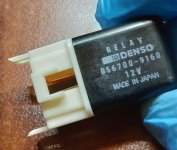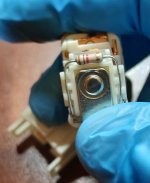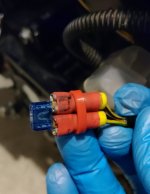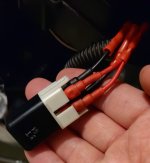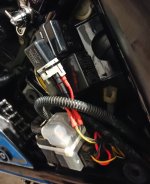Dumping my notes so far and will reorganize as I go, hopefully someone finds this useful or derives something from it. A good laugh at least?
Problem: The starter relay control on older VZ series seem to die due to unknown reasons. The available material on the issue doesn't go into the reason behind the failure of the module and the available DIY fixes don't sit well with me, more on that later. Replacement modules (Mitsuba RK-0313) are rare or expensive, IMHO, and it seems that unless they're new old-stock, they will likely fail in short order as well.
What it ain't: Lots of sources refer to it as the MMM, Mitsuba Mystery Module, or just the Mystery Module.
What it is: Part of the ignition system, it allows the starter relay to energize only when the clutch lever is pulled in, as indicated by the wiring diagram. I gutted it and soaked it in acetone to remove the potting compound. It seems to be based around a A1568 transistor, and the other board components seem to indicate it was configured to act as a relay itself with a snubber network as well. Considering the starter relay is in line with this module, it could have been fried by it.
Found Fix: Replace it with a relay, or just bypass it by splicing some wires together. Both solutions could end with the electrical contacts within the clutch lever welding themselves together. There is some merit to replacing it with a relay that has a built in diode, which I may consider if I give up.
Proposed Fix: Reverse engineer and repair, or reproduce the entire module. If it's worth doing, it's worth overdoing (famous last words)...
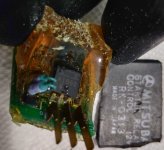

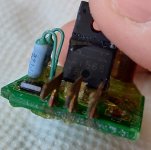
Problem: The starter relay control on older VZ series seem to die due to unknown reasons. The available material on the issue doesn't go into the reason behind the failure of the module and the available DIY fixes don't sit well with me, more on that later. Replacement modules (Mitsuba RK-0313) are rare or expensive, IMHO, and it seems that unless they're new old-stock, they will likely fail in short order as well.
What it ain't: Lots of sources refer to it as the MMM, Mitsuba Mystery Module, or just the Mystery Module.
What it is: Part of the ignition system, it allows the starter relay to energize only when the clutch lever is pulled in, as indicated by the wiring diagram. I gutted it and soaked it in acetone to remove the potting compound. It seems to be based around a A1568 transistor, and the other board components seem to indicate it was configured to act as a relay itself with a snubber network as well. Considering the starter relay is in line with this module, it could have been fried by it.
Found Fix: Replace it with a relay, or just bypass it by splicing some wires together. Both solutions could end with the electrical contacts within the clutch lever welding themselves together. There is some merit to replacing it with a relay that has a built in diode, which I may consider if I give up.
Proposed Fix: Reverse engineer and repair, or reproduce the entire module. If it's worth doing, it's worth overdoing (famous last words)...




